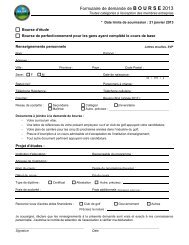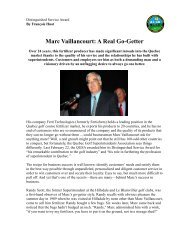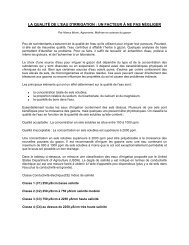Un jugement qui s’applique à mon club <strong>de</strong> golf!QUI PEUT VALABLEMENT UTILISER UNECAMÉRA POUR ÉPIER DES SALARIÉS ETQUAND PEUT-ON LE FAIRE?Imaginez le désarroi d’une fille ou d’un fils qui soupçonne que son père ou sa mère est victime <strong>de</strong> mauvaistraitements ou <strong>de</strong> sévices <strong>de</strong> la part <strong>de</strong>s préposés d’un centre d’hébergement où son parent rési<strong>de</strong>. En 2009,14,9 % 1 <strong>de</strong> la population québécoise était âgée <strong>de</strong> soixante-cinq ans et plus. À une époque où une partie importante <strong>de</strong>la population québécoise se fait vieillissante et donc, nécessairement, plus vulnérable, quels sont les pouvoirs dontdispose un employeur pour veiller à la sécurité <strong>de</strong>s rési<strong>de</strong>nts qu’il gère sans, par ailleurs, porter atteinte à la vie privée<strong>de</strong> ses préposés ? Bref, quelles sont les limites <strong>du</strong> droit à la vie privée d’un employé sur les lieux <strong>de</strong> son travail ?Par M e Pierre GauthierCAIN LAMARRE CASGRAIN WELLSS.E.N.C.R.L. / AvocatsC’est une question sur laquelle la Cour supérieure s’est penchée en 2010relativement à l’admissibilité <strong>de</strong> la preuve dans le cadre d’un grief contestantun congédiement 2 . Voici les faits : monsieur Léandre Contant, atteint<strong>de</strong> la maladie d’Alzheimer, rési<strong>de</strong> dans un centre d’hébergement et <strong>de</strong>soins <strong>de</strong> longue <strong>du</strong>rée (CHSLD). Sa fille, Chantal, remarque <strong>de</strong>s ecchymosessur ses bras et ses mains et déci<strong>de</strong> <strong>de</strong> dissimuler une caméradans la chambre <strong>de</strong> son père. L’enregistrement révèle qu’une préposée,affectée à l’unité où son père est logé, a traîné ce <strong>de</strong>rnier par le brasjusqu’à sa chambre alors qu’il était tombé sur le plancher.Jusqu’à récemment, nos tribunaux avaient décidé qu’un employeurpouvait utiliser une caméra pour analyser le comportement <strong>de</strong> sesemployés dans la seule mesure où on pouvait établir un lien entre cemoyen extraordinaire et les exigences <strong>du</strong> bon fonctionnement <strong>de</strong> sonentreprise. En effet, un employeur ne peut impunément filmer ses employéssans risquer <strong>de</strong> porter atteinte à leur vie privée. Il faut que l’employeurait <strong>de</strong>s motifs raisonnables <strong>de</strong> recourir à ce genre <strong>de</strong> moyen.<strong>de</strong> l’enregistrement pour congédier la préposée fautive et l’arbitre a acceptéen preuve cet enregistrement malgré les objections <strong>du</strong> syndicat.La Cour supérieure a retenu que la fille <strong>de</strong> monsieur Léandre Contantavait <strong>de</strong>s motifs raisonnables <strong>de</strong> recourir à une caméra et a appliquéle même test que lorsqu’il s’agit d’un employeur pour déci<strong>de</strong>r <strong>de</strong> lalégalité <strong>de</strong> la preuve.La Cour supérieure en arrive donc à la conclusion qu’il n’y a pas eu<strong>de</strong> violation <strong>du</strong> droit à la vie privée <strong>de</strong> la préposée aux bénéficiairespuisque cette <strong>de</strong>rnière ne peut s’attendre à voir sa vie privée protégéelorsqu’elle se trouve dans la chambre d’un bénéficiaire. La caméra étaitplacée sur les lieux <strong>du</strong> travail et non pas dans un endroit réservé à <strong>de</strong>sactivités privées <strong>de</strong> la préposée ou <strong>de</strong> ses collègues. En fait, la préposéefournissait, dans la chambre <strong>de</strong> Monsieur Contant, sa prestation<strong>de</strong> travail <strong>de</strong> façon habituelle dans le cours normal <strong>de</strong>s choses. Elle nepouvait donc pas s’attendre au respect <strong>du</strong> droit à la vie privée dans untel contexte.Dernièrement, la Cour supérieure a analysé une situation quelque peudifférente puisque ce n’était pas l’employeur mais la fille d’un bénéficiairequi avait installé une caméra. L’employeur s’est par la suite serviePour conclure, précisons que ce jugement était ren<strong>du</strong> dans <strong>de</strong>s circonstancesparticulières, alors qu’une tierce personne, plutôt que l’employeuragissait <strong>de</strong> façon complètement indépendante en installant unecaméra vidéo sur les lieux <strong>de</strong> travail.Prenez bonne note que ces principes pourraient s’appliquer, entreautres, sur vos propres lieux <strong>de</strong> travail <strong>de</strong> votre club <strong>de</strong> golf. Il est importantdonc pour l’employeur d’être pru<strong>de</strong>nt mais la Cour par cettedécision vient <strong>de</strong> justifier ce moyen <strong>de</strong> preuve dans le cas <strong>de</strong> congédiement.1Institut national <strong>de</strong> santé publique, statistiques, Répartition <strong>de</strong> la population selon l’âge Québec 1971 à2009, page consultée le 12 janvier 2011, [http://www.inspq.qc.ca/Santescope/element.asp?NoEle=1].2Syndicat <strong>de</strong>s travailleuses et travailleurs <strong>du</strong> CSSS <strong>du</strong> Sud <strong>de</strong> Lanaudière (CSN) c. Lalan<strong>de</strong>, 2010 QCCS1239 (CanLII).16 Printemps 2011
Who Can Validly Use a Camera to Spyon Employees and When And what’sthe situation at my golf club?Imagine the alarm of a daughter or son who suspects their father or mother is being mistreated or abused by attendantsat the nursing home where their parent resi<strong>de</strong>s. In 2009, 14.9% of Quebecers were age 65 or ol<strong>de</strong>r 1 . At a time when asignificant portion of the Quebec population is el<strong>de</strong>rly and therefore more vulnerable, what authority do employers haveto monitor the safety of resi<strong>de</strong>nts un<strong>de</strong>r their care without infringing on the privacy of their employees? What are thelimits on employees’ right to privacy in the workplace?By M e Pierre GauthierCAIN LAMARRE CASGRAIN WELLSS.E.N.C.R.L. / Lawyers<strong>de</strong>spite the labor organization’s objections. The Superior Court foundthat the daughter of Léandre Contant had reasonable grounds to usea camera and applied the same test as for an employer to rule on thelegality of the evi<strong>de</strong>nce.The Superior Court therefore found that the attendant’s right to privacyhad not been violated, as she cannot expect her privacy to be protectedwhen she is in a client’s room. The camera was set up in the workplace,not a location reserved for the private activities of the attendant or hercoworkers. The attendant was carrying out her work as usual in Mr.Contant’s room, in the normal course of activities. She could not expecther right to privacy to be respected in this situation.The Superior Court examined this issue in 2010 with respect to the admissibilityof evi<strong>de</strong>nce in a grievance contesting a dismissal 2 : LéandreContant, who suffers from Alzheimer’s disease, lives in a resi<strong>de</strong>ntial andlong term care center (CHSLD). His daughter, Chantal, noticed bruiseson his arms and hands and <strong>de</strong>ci<strong>de</strong>d to hi<strong>de</strong> a camera in her father’sroom. The recording showed that an attendant assigned to her father’sunit dragged her father by the arm to his room after her father fell onthe floor.Note that this judgment was ren<strong>de</strong>red in special circumstances giventhat a third party, not the employer, acted completely in<strong>de</strong>pen<strong>de</strong>ntly byinstalling a vi<strong>de</strong>o camera in the workplace. The same principles couldapply in other settings such as hospitals, senior citizens homes, anddaycare centers.1Institut national <strong>de</strong> santé publique, Statistiques, Répartition <strong>de</strong> la population selon l’âge Québec1971 à 2009, page consulted on January 12, 2011, [http://www.inspq.qc.ca/Santescope/element.asp?NoEle=1].2Syndicat <strong>de</strong>s travailleuses et travailleurs <strong>du</strong> CSSS <strong>du</strong> Sud <strong>de</strong> Lanaudière (CSN) c. Lalan<strong>de</strong>, 2010 QCCS1239 (CanLII).Until recently our courts had ruled that employers could use a camerato monitor employee behavior only if this extraordinary means was necessaryto ensure proper operation of their business. Employers cannotfilm their employees without running the risk of infringing on their privacy.They must have reasonable grounds to use this type of means.In this case the daughter of a client, not the employer, had installed acamera. The employer subsequently used the recording to dismiss theattendant at fault, and the arbitrator admitted this recording as evi<strong>de</strong>ncePrintemps 2011 17


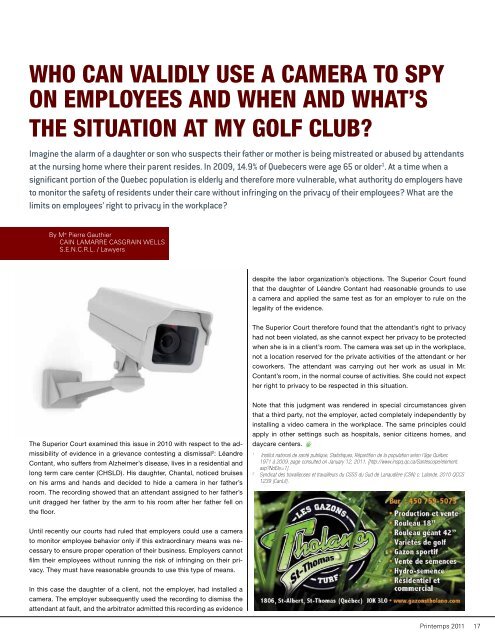
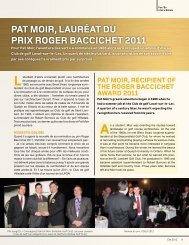


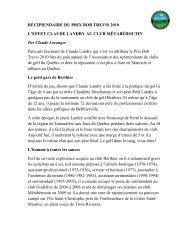


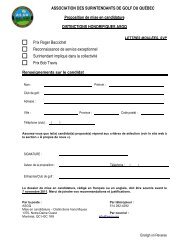


![Prix Bob Trevis - Daniel Read [Mode de compatibilité]](https://img.yumpu.com/38379520/1/190x135/prix-bob-trevis-daniel-read-mode-de-compatibilitac.jpg?quality=85)
